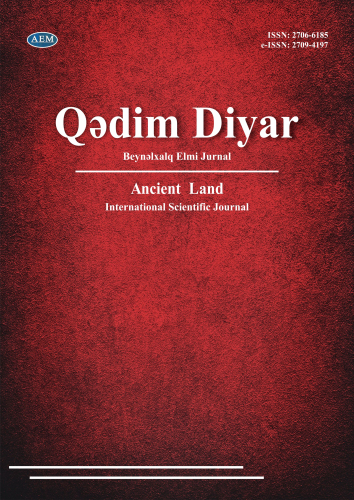DOI: https://doi.org/10.36719/2706-6185/19/5-12
Aynur Aydın qızı Fərəcova
Azərbaycan Texniki Universiteti
filologiya üzrə fəlsəfə doktoru
“OĞUZNAMƏ” EPOSUNUN UYĞUR VERSİYASINDA
OĞUZ KAĞAN OBRAZININ TEOQONİK SEMANTİKASI
Xülasə
Türk epik-mifoloji düşüncəsində teoqonik obrazlar sisteminin tədqiqi baxımdan ən zəngin qaynaqlardan birini çoxsaylı variantları olan “Oğuznamə” eposu təşkil edir. “Oğuznamə” dastanının bizə məlum olan variantlarının, demək olar ki, hamısı islami oğuznaməlıdir. Onların içərisində yalnız biri – uyğur hərfləri ilə yazılmış “Oğuz kağan” dastanı bu baxımdan istisna təşkil edərək, İslamdan qabaqkı epik-mifoloji görüşləri əks etdirir. “Oğuz kağan” dastanının əlamətdar cəhəti onda Oğuz teoqoniyasının bütöv bir proses şəklində öz ifadəsini tapmasıdır. Dastan bu cəhətdən Oğuz teoqonik təsəvvürləri haqqında zəngin biliklər təqdim edir. Dastanda Oğuz kağan bilavasitə tanrı Ay kağanın övladı kimi “Tanrı oğlu” statusunu daşıyır. Oğuz kağan bir Tanrı oğlu olduğu üçün onun övladları da Tanrının nəsli, yəni nəvə-nəticələri hesab olunurlar. Beləliklə, “Oğuznamə”nin uyğur versiyasında təsvir olunan yaradılış prosesi Tanrıdan başlanmaqla tam bir teoqonik sistemidir.
Açar sözlər: teoqoniya, Oğuznamə, Oğuz kağan, Tanrı, dastan, epos, mifologiya, kosmoqoniya
Aynur Aydin Farajova
Azerbaijan Technical University
doctor of pilosophy in philology
karimovaaynur@gmail.com
Theogonical semantics of Oguz khagan image in the uigur version of
the epic "Oguznama"
Abstract
One of the richest sources for the study of the system of theogonic images in Turkish epic-mythological thought is the epic "Oguzname", which has many variants. Almost all of the versions of the "Oghuznama" saga known to us are oghuznams related to the Islamic religion. Only one of them - the epic "Oguz Kagan" written in Uyghur characters, is an exception in this respect and reflects epic-mythological encounters before Islam. The remarkable aspect of the "Oguz Kagan" epic is that the Oguz theogony finds its expression in the form of a whole process. In this respect, the saga provides rich knowledge about Oghuz theogonic ideas. In the epic, Oguz Kagan has the status of "Son of God" as the direct son of the god Ay Kagan. Since Oguz Kagan was a son of God, his children are considered God's descendants, that is, his grandchildren. Thus, the process of creation described in the Uighur version of the Oguzname is a complete theogonic system, beginning with God.
Keywords: theogony, Oguzname, Oguz khagan, God, epic, heroism, mythology, cosmogony

